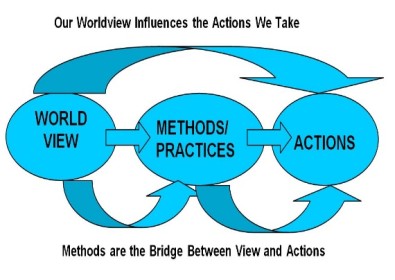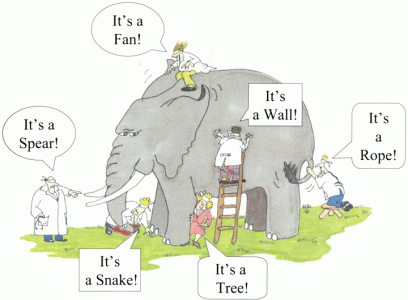4. A Comparison of World Views (iii)
Lesson Objectives
In the last two lessons we briefly considered 5 different world views, against the background of Biblical Christianity. This week, we will consider three further world views that are prominent in the public square:
- Pluralism
- Relativism
- Nationalism
How can we critique current Western thinking? It is hard to be objective when we are subjectively involved. We absorb more than we think.
Most of what we hear from our leaders, social media, right/left wing commentariat, educators and arbiters of thought (and political correctness) has so influenced our epistemology that we increasing find it hard to recognise, or to differ, either because we do not like the disapproval of others or because we have unconsciously adopted the same, or compatible, thought patterns.
Remember: what we adopt as truth we practice.


We are all exposed on a daily basis to opinions that are anchored in non-Christian world views that we fail to challenge because we have subconsciously adopted them, uncritically. Pluralism, relativism and nationalism are three examples.
| World View | Pluralism | Relativism | Nationalism |
|---|
| Source/s |
Immigration, emigration, global media, television, leaders' discourse. |
Positivism, existentialism. |
Political leaders. Historians. Media. |
|---|
Theology
What about God? |
In a pluralistic society all forms of God, or the complete absence of God are acceptable. |
Post-modernism. |
The state trumps God, unless He can be co-opted to take "our" position. |
|---|
Philosophy
What is real, meaningful? |
We should all be faithful to ourselves, whilst not upsetting the equanimity of society by imposing our own beliefs. |
Whatever "works". Self-actualisation. |
The state, the nation, history, common goals, striving together for what we believe collectively. |
|---|
Ethics
What's right? |
What society believes; there may be variations on this. Each person should live by their social group as long as they contribute to social harmony. |
If it feels good it is acceptable. |
Whatever works for the common good. May need to be enforced. Dissenting views are regarded as a threat. |
|---|
Biology
What about Life |
Different beliefs about creation or evolution; all have their places and are equal. |
Evolution. |
Some ethnic groups are inherently superior; often due to evolution, education, longevity or strength. |
|---|
Psychology
What about Human Nature |
Religion, humanism. |
Self-actualisation. Be yourself. Notions of guilt are avoided at all costs. |
The human imagination can be harnessed to the good of the state. |
|---|
Law
Who makes the rules? |
The dominant ethne, however there may be scope for variation, eg Shari'a or customary law. |
Government. However, obedience is contingent on being for the common good. |
Rulers, of the people, by the people, for the people. |
|---|
Politics
Who is in charge? |
The dominant ethne. |
Private belief. |
Strong leaders who are committed to shared dominant discourse. |
|---|
Economics
What about resources? |
Wealth is good for all and should be shared equitably. |
This depends on what is seen as good by the individual. |
Ethnocentric.
The dominant society should control all resources, for the common good and protection from those who would undermine national or tribal values or dominance. |
|---|
History
Interpreting the past and the current state of the world for clues as to the future |
Complex because often contradictory; what is important is NOW. |
The past was characterised by religious dogmatism or social engineering. We can be free from these constraints. |
Tribalism, myths. The "story" belongs to the winners. |
|---|
Pluralism
"We all believe in the same God."
Pluralism is a belief that, as society is made up of people from different worldviews, ethnic backgrounds, social histories and culture, so all forms and beliefs are acceptable. The practice of pluralism is as old as civilisation.
Religious pluralism is the belief that every religion is valid, ie that none has an exclusive claim to truth, all have an equal claim on truth (what is truth?) and should be honoured as such.
"The blind men and the elephant"

Once upon a time, there lived six blind men in a village. One day the villagers told them, "Hey, there is an elephant in the village today." They had no idea what an elephant was. They decided, "Even though we would not be able to see it, let us go and feel it anyway." All of them went where the elephant was. Each of them touched the elephant. "Hey, the elephant is a pillar," said the first man who touched his leg. "Oh, no! it is like a rope," said the second man who touched the tail. "Oh, no! it is like a thick branch of a tree," said the third man who touched the trunk of the elephant. "It is like a big hand fan" said the fourth man who touched the ear of the elephant. "It is like a huge wall," said the fifth man who touched the belly of the elephant. "It is like a solid pipe," Said the sixth man who touched the tusk of the elephant. They began to argue about the elephant and each of them insisted that he was right. It looked like they were getting agitated. A wise man was passing by and he saw this. He stopped and asked them, "What is the matter?" They said, "We cannot agree to what the elephant is like." Each one of them told what he thought the elephant was like.
The wise man calmly explained to them, "All of you are right. The reason every one of you is telling it differently is because each one of you touched a different part of the elephant. So, actually the elephant has all those features that you described." "Oh!" everyone said. There was no more fight. They felt happy that they were all right.
http://www.jainworld.com/literature/story25.htm
Religion professors love this parable, because it equalizes religions, making them all "true" in their description of ways to understand and reach God, ie no single religion has a corner on truth, but all should be viewed as equally valid.
Christianity arose in the context of a plurality of competing religions. One of the most pluralistic cities in the New Testament world was Antioch, situated on the cross-roads between Europe, Asia Minor, Africa (overland) and the east. During the first centuries of the church people living in cities had a fair idea of what non-Christians believed; cities were sophisticated, but the world was small.
Over time (during the Middle Ages), Western Christian communities became more homogeneous in the political construct known as Christendom (European Christian tradition and organisation). Today, we are surrounded by people from all faiths. Western governments pursue policies of multiculturalism, though events in Europe in 2015 have challenged the security that pluralism formerly inferred.
Different religious and faith groups cannot all be right. They make different (often opposite) claims and have different values. Consider views about God, the Bible, the person and work of Jesus Christ, sin, salvation, eternity. Either Jesus Christ is God or He is not. Religious pluralism as a construct does not work. It contradicts the Law of Non-Contradiction, ie A and the opposite of A cannot both be true at the same time and in the same way. Square circles do not exist.
Jesus made unequivocal claims about Himself- John 14:6, cf Acts 4:12. Christians cannot accept the claims of Islam, Hinduism, Buddhism, Daoism or any other faith system, because they are at odds with the Bible.
Pluralism as policy is appealing in a heterogeneous society where governments want peace. Pluralism appears tolerant; however Christians often find that it is intolerant of Christian claims to truth.
Discussion: how can Christians coexist and live at peace with non-Christian religions? How can we show respect for people while not accepting their religions?
Through globalism, migration, rapid spread of knowledge and ideas and interest in diverse traditions, modern Australia has experienced an influx and expansion of religious traditions. A religiously diverse nation. Hindu and Buddhist temples, Sikh gurdwaras, and Muslim mosques sit alongside Christian churches and Jewish synagogues. cf The Life of Pi.
Pluralism is proclaimed as the ground for melting all religions into a porridge of new religious ideas. Court decisions target churches proclaiming the Gospel in a pluralistic society (eg anti-vilification laws). Pluralism leads to undermining of (and, often, hostility towards) Christian values in the education sphere. Much inter-faith dialogue washes away distinctives and weakens the unique claims of the Gospel.
Relativism
- "That is your truth, not mine."
- "Truth is a matter of personal opinion."
- "No system of truth is more valid than any other."
- "Everyone should live according to their lights."
- "Most people think (that) is not a problem."
Like pluralism, relativism holds that all points of view are equally valid and all truth, all expressions, are relative to the individual.
 "One way... many ways... all are equal"
"One way... many ways... all are equal"
Relativism is pervasive in modern Australia. With the rejection of Christian faith, faith values tend to be abandoned. Right and wrong as extremes no longer exist. Boundaries are pushed in civil law, education, entertainment, the view of marriage and the family, ethics in the workplace, commitment to society. Relativism teaches that "It does not matter what you believe, as long as you feel right about it" (cf situational ethics). Experience is everything.
Undermining belief tends to be iterative, ie succeeding generations are more accommodating; eventually they start to adopt the same positions and cite the same arguments. It is hard to claw back from there.
Relativism seeks to challenge/replace Christian views on:
- the meaning of life
- authority
- popular culture
- ethics
- homosexuality, abortion
- euthanasia
- marriage
- the home and children
- acquisition and use of money and other resources
- notions of right and wrong
Those who have Christian values and express them about these sensitive issues are labelled bigots, intolerant, or prejudiced. Such a reaction is, in fact, a fundamental contradiction of the theory of relativism.
It is true that in a free society people will have different views. All too often those who make such accusations against Christians are silent with regard to the structures and teaching of other religions practiced in the same society. So, who is really prejudiced?
It is easy to accept a relativist position. Those who argue this way are "logical". "Nobody wants an argument." The irony is that relativism ultimately fails because no one would want to live in a world run by relativists.
Consider these value propositions:
- "Everyone is entitled to their opinion about ... which side of the road to drive on".
- "Make up your own mind about what you believe ... about paying taxes."
- "There must be absolute truths. Otherwise society would descent into anarchism; social averages would be more valid than the law."
Discussion: what are some arguments commonly used in a relativist discourse? (EG "We stand for human rights"; "Companies that pollute still have to make a profit for their shareholders":
Nationalism
Nationalism means a sense of national consciousness or awareness that exalts nation, state, or tribe, above all others, and promotes its history, values, political and economic systems and cultural priorities ahead of others.


Many Christians get caught up in secular humanist nationalism and adopt faulty logic:
- "the nation state is the fundamental value in our society"
- "we are a Christian nation"
- "our national roots are based on Christianity" (therefore our nation is "Christian" by rights and believers should be in charge; we should reclaim the nation from the forces of evil; God and His people should have dominion in civil and political structures and turn the nation back to Him
- "our ethnic group understands truth better than others"
Nationalism allows a non-Biblical view to cloud our views about what is true.
Christianity is based on the Kingdom of God, and to Kingdom living, not our nation state. We are required by Christ to "give to Caesar what belongs to Caesar" (Mark 12:17). We are to be salt and light; God raises up men and women of faith who can influence society by their Christian values (enunciated or otherwise). But as Christians we also have another citizenship that trumps our earthly nationalities (read Hebrews 11:6, 13; Revelation 5:9b; Philippians 3:20).
It is only natural for people to feel a strong sense of identity with their country, language, people group, culture and sense of place, whether through birth or adoption (by immigration). However, Christians in the West sometimes confuse nation, secular traditions and values with eternal values.
Christians are required to submit to government (Romans 13) and pray for those who rule (but accept that society has non-Christian underpinnings). There is no Biblical assumption that Christians should rule nations, or that if they do they will automatically do so in a Christian way; Christians are fallible; they take sides, make poor judgements and can succumb to pride and greed.
Some Christian leaders have sought to deconstruct our national histories with a view to establishing a Christian state (cf 1 John 4:19). This is not Christianity, it is politics. There is no visible "Christian nation" (cf theocracy ruled by authoritarians).
Christians find it easy to take sides with political parties, eg
- "the Right defends our traditional values"
- the "religious Right" will stop us being captivated by malevolent spiritual forces and will hold to the moral values we believe in as a Christian community
- the "Left looks after the poor and the downtrodden like Jesus"
- the Greens defend the planet God created and made us stewards to tend
- Christian parties will protect our Judeo-Christian heritage
- There is nothing inherently sacred about any political party.
God does not vote Liberal, Labor, National, Green, "Christian" Democrat, or Family First.
While there are many reasons to celebrate the Judeo-Christian heritage, and be grateful for it, our world view should never confuse or conflate the cross of Christ with our flag or national discourse. This is a false iconography. We cannot compare apples with oranges.

Christians need to be wary of the hazards involved in unquestioningly supporting other peoples' nationalisms and political claims as articles of faith.
Discussion: Should Christians get involved in political, economic or social leadership? How can their world views remain Christian whilst they operate in a non-Christian world?
 "Don't let the world around you squeeze you into its own mould, but let God re-mould your minds from within" (Romans 12:2, JB Phillips)
"Don't let the world around you squeeze you into its own mould, but let God re-mould your minds from within" (Romans 12:2, JB Phillips)



 "One way... many ways... all are equal"
"One way... many ways... all are equal"


 "Don't let the world around you squeeze you into its own mould, but let God re-mould your minds from within" (Romans 12:2, JB Phillips)
"Don't let the world around you squeeze you into its own mould, but let God re-mould your minds from within" (Romans 12:2, JB Phillips)